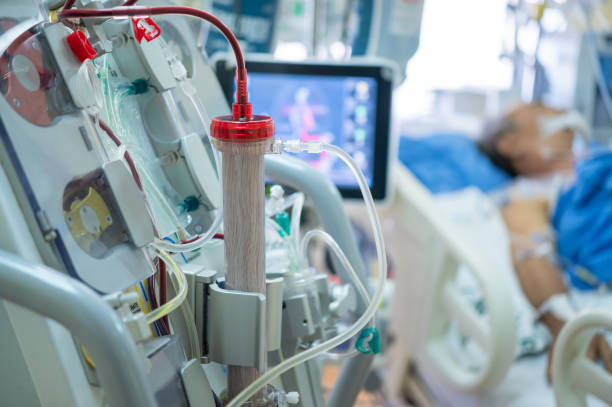(NEW YORK) -- Specialists transplanted a pig's kidney into a brain-dead man, and it worked normally north of the moon -- a fundamental step toward an activity that a New York group hopes to test in living patients in the long term.
Scientists across the country are trying to figure out how to use the creatures' organs to save human lives, and the bodies that have been donated to research offer a remarkable practice.
The most recent examination, announced Wednesday by NYU Langone Wellbeing, marks the longest time an individual's pig kidney has functioned, yet left — and it's not finished. Scientists are set to monitor the kidney's presentation over the next month.
"Is this organ really going to function like a human organ? So far it looks like it will," Dr. Robert Montgomery, head of the NYU Langone Transfer Foundation.
"It looks a lot better than a human kidney," Montgomery said on July 14, as he replaced the deceased man's own kidney with a lone kidney from a genetically altered pig — and watched as it quickly began urinating.
The prospect that pig kidneys could one day help ease a critical shortage of transplantable organs convinced a group of 57-year-old upstate New York operator Maurice "Mo" Mill to donate his body to the investigation.
"I struggled with it," his sister, operator Mary Mill Duffy, told the AP. Still, he preferred to help other people and "I think this is what my sibling would need. So I offered my sibling to them."
"It will be in the clinical books and it will live on," she added.
Genetically altered pigs
Efforts at creature-to-human transmission failed for quite a long time, as the insensitive structures of the individuals followed the unknown tissue. Currently, experts are using pigs that have been genetically modified so that their organs better match the human body.
Last year, with exceptional approval from the controllers, specialists at the College of Maryland transplanted a high-quality modified pig heart as a last-ditch effort to save a dying human. It lasted only a short time before the organ went out for reasons that are not yet fully seen and offer examples for future endeavours.
Currently, the Food and Medication Organization is considering whether to allow a few but thorough trials of pig heart or kidney transplants in volunteer patients.
Understand more: Ongoing kidney infection is poised to turn into the dark lung of environmental change
The NYU trial is one of a series of improvements aimed at speeding the start of such clinical trials. Similarly, on Wednesday, the College of Alabama at Birmingham revealed another major achievement -- a pair of pig kidneys worked normally in one other given body for seven days.
Kidneys don't just pee - they provide many positions in the body. In the journal JAMA Medical, the UAB specialist Dr. Jayme Locke detailed laboratory tests recording an exhibition of qualitatively modified pig organs. She said the week-long study shows they can "provide life-supporting kidneys."
Those tests are essential to responding to other overblown inquiries "in an environment where we're not putting someone's life at risk," said Montgomery, a kidney transplant specialist in New York who has also received his own heart transplant -- and is very knowledgeable about it. demand for another source of organs.
Long hanging tight list for transfers
More than 100,000 patients are in the country with a decline in transfers and thousands are suspended each year.
Previously, NYU and a group at the College of Alabama at Birmingham had tried pig kidney transplants in expired recipients for just a few days. The NYU group also transplanted pig hearts into bodies for three days of serious testing.
Still, how do pig organs really respond to the more normal safe running of a human, which takes about a month to take off? Only longer testing could tell.
The medical procedure itself is not the same as the thousands he's performed, "but somewhere in your subconscious, there's the enormity of what you're doing ... because you realize it could affect the fate of the transplant immensely," Montgomery said. .
The activity required careful timing. Early morning Drs. Adam Griesemer and Jeffrey Harsh flew many miles to the office where Revivicor Inc. is based. based in Virginia, genetically altered pigs—and regenerated kidneys that fell short of the quality that would trigger rapid extermination by a safe framework for humans.
As they rushed back to NYU, Montgomery was removing both kidneys from the donor body, so there was no doubt that the soon-to-be pig form was working. One porcine kidney was transferred, the other set aside for correlation when the analysis was finished.
"You're not kidding," Griesemer said. To see it so quickly, "there was a great rush and part of the positive feelings."
How long should these examinations take? Locke of Alabama said that it is not satisfactory - - and the moral questions include how long the family is pleasant or whether it contributes to their melancholy. Since keeping a dead individual's mind on a ventilator is problematic, it also depends on how stable the body is.
In her own examination, the body was solid enough that if the review wasn't expected to end after seven days, "I think we could have gone significantly longer, which I think offers extraordinary expectations," she said.
Dr. Muhammad Mohiuddin of the College of Maryland points out that it is not satisfactory how a deceased body deliberately impersonates a patient's reactions to a pig organ - however, this research is teaching the general population about xenotransplantation, so "individuals will not be overwhelmed" when now is the perfect time to try again in life."








.jpg)

0 Comments